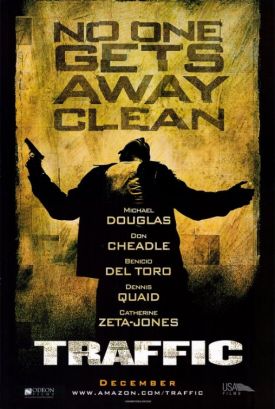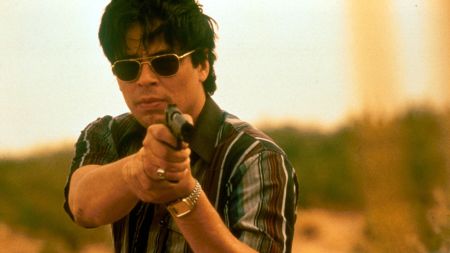The Contender: Traffic (2000)
Number of Nominations: 5 - Picture, Supporting Actor (Benicio Del Toro), Director (Steven Soderbergh), Adapted Screenplay (Stephen Gaghan), Film Editing (Stephen Mirrione)
Number of Wins: 4 (Supporting Actor, Director, Adapted Screenplay, Film Editing)
Steven Soderbergh released two films in 2000, Erin Brockovich and Traffic. Both were critically acclaimed. Both were hits at the box office, each one making over $100 million. And when Oscar time rolled around, both received multiple nominations. In fact, Soderbergh became the first filmmaker since 1938 to receive two nominations in the same year for Best Director. But while the previous record-holder, Michael Curtiz, went home that night empty handed, Soderbergh actually won.
For a while, it seemed as though Traffic might also win Best Picture. But the Oscars played out differently that year. The year’s biggest prize went to Ridley Scott’s Gladiator, making it one of the few Best Picture winners not to be honored for either directing or writing also. Even so, Traffic did extremely well, winning four of the five categories for which it was nominated.
Perhaps it isn’t surprising that Traffic won accolades and awards. But it is somewhat surprising that it was a hit. This is a complex, multilayered story with a sprawling cast of characters that rarely intersect in obvious ways.
Michael Douglas plays the newly-appointed drug czar whose new job takes a back seat when he discovers his daughter (Erika Christensen) is herself heavily addicted. Benicio Del Toro is a mildly corrupt Tijuana cop who finds his own limits when recruited by General Salazar (Tomas Milian), who wants to break the Tijuana cartel for reasons of his own. Catherine Zeta-Jones is a wealthy mother-to-be who only discovers her “legitimate businessman” husband (Steven Bauer) is a trafficker after he’s dragged to prison by the DEA. Don Cheadle and Luis Guzman are DEA agents assigned to protect the key witness in Bauer’s case. And those are just the main plot threads.

But Soderbergh, who almost always acts as his own cinematographer under the pseudonym Peter Andrews, developed a unique visual shorthand to keep the various stories clear. Working with color, different film stocks, and post-production tricks, Soderbergh gives each story its own individual style. It’s a brilliant move. The film runs slightly over two hours but never feels long. There’s simply too much story to tell for your interest to flag. But it’s also never confusing, a charge I’ve heard leveled at screenwriter Stephen Gaghan’s similar follow-up, Syriana.
It’s fair to say that Traffic hit a nerve with the public that Syriana would never have been able to find. I admire Syriana quite a bit but the labyrinthine machinations of the oil industry are a lot more abstract to most people than the war on drugs. I imagine everyone has a story to tell about how drugs have affected their lives or someone close to them. One of Traffic’s great strengths is its ability to make us see not only our own story reflected back but the bigger picture we never dreamed existed.
If Soderbergh and Gaghan deserve credit for economy of storytelling, the ensemble cast earns most of the kudos for making us believe in these characters. We learn almost nothing about the personal lives of Cheadle and Guzman. But we can fill in the blanks thanks to their effortless chemistry. Zeta-Jones makes a thoroughly believable transformation from idle rich wife to a ruthless Lady Macbeth. And the Oscar-winning Del Toro is a smart, soulful survivor. The moment when he half apologetically confirms to a pair of American tourists that their “stolen car” is a police scam speaks volumes.
Traffic seems to view the war on drugs as futile but surprisingly ends on a note of some hope. The smile on Cheadle’s face as he walks away from Bauer’s home and the contented look Del Toro has as he watches a baseball game suggest that all is not lost. But there is a good chance that this “war” is being fought all wrong.
The world has changed a lot in the eleven years since Traffic debuted. Drug cartels have turned Mexico into a war zone. The director of the Office of National Drug Control Policy, or the so-called “drug czar,” is no longer a Cabinet-level position. Yet, Traffic remains relevant. No doubt it will continue to as long as illegal drugs are bought, sold, and abused. Rather than the screeching anti-drug harangue it could have been, Soderbergh made a quietly powerful, thoughtful film examining the problem from multiple perspectives. Whether or not it’s his crowning achievement is debatable. But it’s a high-water mark that brilliantly displays Soderbergh’s ambitions and confidence as a storyteller.
Traffic is available as on Blu-ray and DVD from both The Criterion Collection and Universal.
- Adam Jahnke

